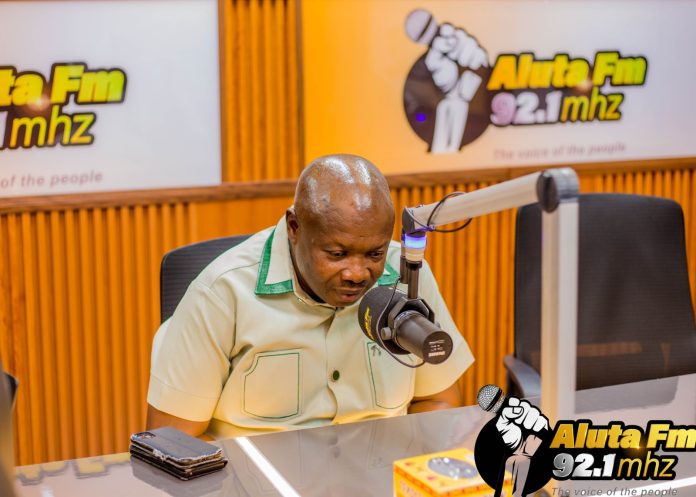The Greater Accra Regional Football Association (GARFA) chairman has reaffirmed his commitment to ensuring safety, professionalism, and fairness in the region’s ongoing football leagues, stressing that strict compliance with medical and operational requirements is non-negotiable this season.
Speaking in an interview on ALUTA FM 92.1 in Madina, the chairman provided updates on the state of football activities in the region, highlighting the progress made across various divisions and the measures being taken to strengthen management and player welfare.
“So far, we’ve played a lot of leagues,” he said. “This weekend, we played match day five for Division Three, match day two for Division Two, and some have already played match day one. If you go to the coastal areas, some have played match day one, and some match day four. In the Oman Women’s Division, some have played match day four, so this weekend will be match day three.”
According to him, the Greater Accra region has officially commenced all its football leagues, with strong participation across both male and female divisions. However, he noted that while the matches are going smoothly, there are still challenges with medical preparedness and enforcement of safety rules, especially in the lower divisions.
“Most of the time, clubs bring their own medical team,” he explained. “But when we’re playing in the middle division, I provide the ambulance, and we mostly have a medical team available. For middle division, we usually play all the matches at one venue, so it’s easy to manage.”
The chairman expressed concern that some referees and match commissioners are not enforcing medical regulations as strictly as they should. “For Accra Second Division, we play about 35 matches a week, so there are lots of games,” he said. “What we mostly do is at the technical meeting, the match commissioner and the referees remind all clubs about their medical arrangements, who’s in charge and what’s been provided. Some referees and match commissioners are trained and are supposed to enforce that law, but most of the time, they don’t.”
He added that referees and match commissioners have a responsibility to ensure that emergency medical measures are in place before matches begin. “They have to ask: in case a player is injured or seriously hurt, is there a car to take the player to the hospital? The match commissioner must ensure that. They also have to find out the nearest hospital available,” he emphasized.
The chairman also revealed that his office has taken steps to strengthen emergency response structures at all league venues. “In my region, I’ve put up a structure at all the venues so that if there’s an emergency, they can use it,” he said. “But honestly, I think this should be a wake-up call to all of us. We don’t need to wait until something happens before enforcing the rules. The clubs should provide these things before the game starts.”
He insisted that the law is clear on the matter and vowed to ensure that matches do not proceed without an ambulance or adequate medical presence. “The law says that if you don’t bring in an ambulance, the game won’t commence,” he stated firmly. “But sometimes people take it lightly because it’s their friend or brother in charge, so nothing happens. Let me tell you something: if I say the league won’t start until there’s an ambulance, then we are going to follow that law strictly. Emergencies can happen anytime, and we should always have one available.”
Recalling a previous incident, he shared, “I remember once, one of my games delayed a little because a player got injured before the ambulance arrived. Luckily, when the player got injured, the ambulance came just in time, and we were able to take him to the hospital. It was very serious, but that’s how we managed it. These things show why enforcement is so important.”
The chairman also touched on sponsorship deals that have boosted the regional football leagues. “We have sponsorship from Soccer Bet and now Ashley’s Sports and Gamey also sponsor us,” he revealed. “Soccer Bet signed a partnership with the second division worth 800,000 Ghana cedis for three years. The first year is 250,000, the second year is 250,000, and the third year is 300,000. Altogether, it’s 800,000 Ghana cedis.”
He said part of the sponsorship funds is used to support the welfare of teams, coaches, referees, and players. “We use some of that money to pay the upkeep fees for teams, the best coaches, best players, best referees, and best assistant referees for both male and female divisions,” he said. “We also pay for women’s Division 2 and middle league activities.”
Highlighting a key benefit for clubs, he noted, “Normally, the middle division clubs pay for their registration, but last season, by God’s grace, no club paid, it was free. This season too, it will be free since they are already on board.”
He concluded by stressing that all professional contracts under the league are protected by labour laws. “Anyone who is under a professional contract, we pay them. It’s under the agreement and the labour law. So if you don’t comply or don’t pay a player for some months, that means he’s a free player,” he explained.
With the season in progress, the Greater Accra Football Association’s leadership appears focused on ensuring that every match is conducted with discipline, fairness, and safety, values the chairman believes are critical to sustaining the growth and credibility of football in the region.



